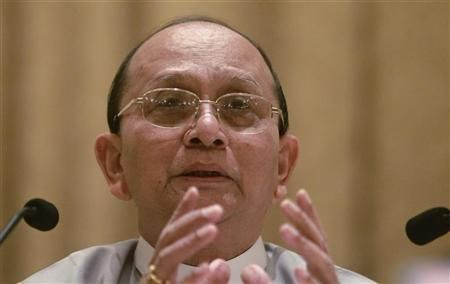President Obama To Meet Myanmar’s President Thein Sein In Washington Amid Apprehensions Cast Over Nation's Reforms

President Barack Obama will meet Myanmar’s President Thein Sein on Monday, the first head of his country to visit the White House in 47 years, amid apprehensions about the sustainability of the nation’s internal reforms marred by sectarian violence.
Responding to concerns regarding the human rights record of Myanmar’s government, the State Department spokesperson Jen Psaki remarked that Myanmar had “made a number of positive reforms in recent years.”
“They’ve recently released over 850 political prisoners. They’ve eased restrictions on the media and increasingly respect freedoms of expression, assembly, and movement,” Psaki said on Thursday, adding that Myanmar’s rights record will be a part of the discussion during Thein Sein’s visit.
On Friday, Myanmar released approximately 20 political prisoners, amid claims that there was a pattern to Myanmar authorities freeing prisoners at strategic times before foreign governments decide on sanctions or before key foreign visits.
Washington’s re-engagement with Myanmar went into top gear in November, when President Obama became the first ever sitting U.S. President to visit the Asian nation.
Earlier this month, the U.S. extended targeted sanctions against Myanmar for another year, but eased some visa restrictions imposed against members of the country’s former military regime.
The move closely followed a European Union decision to lift all sanctions, except for an arms embargo, against Myanmar.
Last year, the U.S. normalized diplomatic relations and lifted most trade and investment sanctions on Myanmar.
Thein Sein, 67, took office in March 2011, after the country's first election in 20 years in November 2010. Since then, he has led democratic reforms in Myanmar, which had been under the rule of a military junta, of which he had been a key member.
By-elections last April saw Aung San Suu Kyi’s National League for Democracy (NLD) win a landslide victory, and weeks later the former political prisoner was sworn into the parliament.
Hundreds of political prisoners were freed between May 2011 and July 2012, and an amnesty was announced in September for 88 dissidents, but several hundred political prisoners are still languishing in Myanmar's jails.
In April, as the EU announced the rollback on Myanmar sanctions, Human Rights Watch (HRW) published a damning report accusing the Burmese authorities of committing “crimes against humanity in a campaign of ethnic cleansing against Rohingya Muslims.” The rights group held the Myanmar government and local authorities accountable for the forcible displacement of more than 125,000 Rohingya and other Muslims.
© Copyright IBTimes 2024. All rights reserved.






















